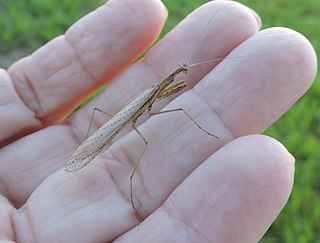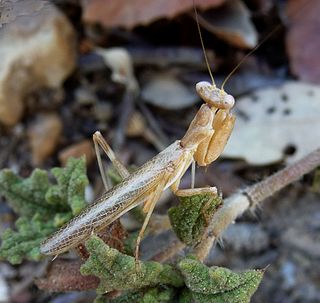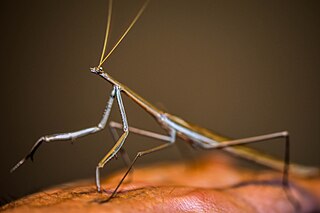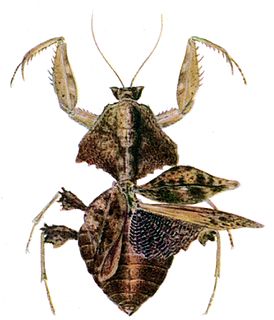
Heinrich Kuhl was a German naturalist and zoologist.

Mantidae is one of the largest families in the order of praying mantises, based on the type species Mantis religiosa; however, most genera are tropical or subtropical. Historically, this was the only family in the order, and many references still use the term "mantid" to refer to any mantis. Technically, however, "mantid" refers only to members of the family Mantidae, and not the 14 remaining families of mantises. Some of the most recent classifications have promoted a number of the mantid subfamilies to the rank of family, e.g. Iridopterygidae, Sibyllidae, Tarachodidae, Thespidae, and Toxoderidae, while other classifications have reduced the number of subfamilies without elevating to higher rank.

The mantis family Metallyticidae consists of a single small genus, Metallyticus, living mostly in South-East Asia. The species are dark, somewhat flattened and cockroach-like, often with a cuticle that is reflective and metallic in appearance.

Mantoida is a genus of mantis in the family Mantoididae.

Amorphoscelidae is a family of mantises in the order Mantodea.

Eremiaphilidae is a small Old World family of praying mantids, based on the type genus Eremiaphila. As part of a major revision of mantid taxonomy, this family now contains the subfamily Tarachodinae, which includes tribes and genera previously placed in the now obsolete Tarachodidae.

Hymenopodidae is a family of the order Mantodea (mantises), which contains six subfamilies. Some of the species in this family mimic flowers and are found camouflaged among them; these are called flower mantises. Their coloration is aggressive mimicry, luring prey to approach close enough to be seized and eaten.

Mantinae is a subfamily of praying mantids of the family Mantidae. It was authored by Hermann Burmeister in 1938.

Liturgusidae is a family of praying mantids in the new (2019) Neotropical superfamily Acanthopoidea. A substantial number of genera, previously placed here, have recently been moved to the new or revived other families:

Thespidae is a family of Neotropical insects in the order Mantodea. Following a major revision of this order in 2019, the old-world subfamilies Haaniinae and Hoplocoryphinae, previously placed here, have been upgraded to family level.

Iridopterygidae was a family of praying mantids in the order Mantodea whose members, having formerly been moved here as a subfamily within Mantidae, have now been transferred elsewhere as part of the recent (2019) major revision of mantid taxonomy.

Miomantinae is the larger subfamily of insects in the new (2019) family Miomantidae of order Mantodea. As part of a major revision of mantid taxonomy; an additional subfamily Solygiinae contains the sole genus Solygia and the tribe Rivetinini has essentially been elevated to family Rivetinidae. A number of genera have also been transferred from here to the Hierodulinae.
Epaphroditidae is a family of the Mantodea, containing species found in Africa and the Caribbean. Before 2015, it had been placed as the subfamily Epaphroditinae, in the Hymenopodidae, but is now excluded.

The mantis family Amelidae was previously placed in the family Mantidae. Species have been recorded from Africa, Asia, Europe and North America.

The Hierodulinae are a subfamily of praying mantids, originally used by Brunner von Wattenwyl. It was restored as part of a major revision of mantid taxonomy, and now contains genera previously placed elsewhere in the family Mantidae.

The Leptomantellidae are a new (2019), small family of praying mantids, based on the type genus Leptomantella. As part of a major revision of mantid taxonomy, genera have been moved here from the Caliridinae in the now obsolete family Tarachodidae.

Hoplocoryphidae is a newly erected (2019) family of praying mantids, based on the type genus Hoplocorypha. As part of a major revision of mantid taxonomy, genera have been moved here from the subfamily Hoplocoryphinae of the previously polyphyletic family Thespidae. The family Hoplocoryphidae is the only member of superfamily Hoplocoryphoidea. Species in this family have been recorded from tropical Africa.
Dactylopterygidae is a family of praying mantises, based on the type genus Dactylopteryx. The first use of "Dactylopterygidae" was by Giglio-Tos and it has recently (2019) been revived as part of a major revision of mantis taxonomy; three genera have been separated from others in the subfamily Liturgusinae and moved here from the family Liturgusidae.

The Majangidae are a revived (2019) family of praying mantids from Madagascar.

The Rivetinidae are a family of praying mantids, based on the type genus Rivetina. As part of a major revision of mantid taxonomy, this family contains many genera moved from Miomantinae: tribe Rivetinini; some genera previously placed there have now been moved to the new families Deroplatyidae and Chroicopteridae. The new placement of this taxon is in the superfamily Eremiaphiloidea and infraorder Schizomantodea.

















